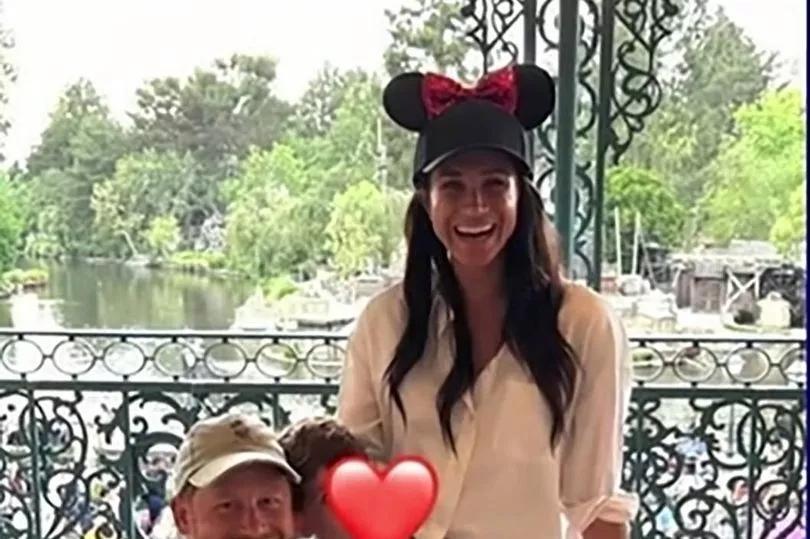Ever since their Royal exit, Prince Harry and Meghan Markle have been vocal about their ongoing feud with the Duke’s family.
The couple surprised many when they announced in 2023 that they would use their children’s Royal titles, a decision reportedly influenced by a crucial conversation with two of Harry’s relatives.
Following their daughter Lilibet’s christening in California, they expressed their desire for their children to adopt their Royal titles.
This came despite Meghan and Harry no longer being able to use HRH titles themselves, and Meghan’s 2021 statement to Oprah Winfrey that she had no “attachment” to the “grandeur” of Royal life.
A Sussex spokesperson stated: “The children’s titles have been a birthright since their grandfather became monarch. This matter has been settled for some time in alignment with Buckingham Palace.”, reports the Mirror.
READ MORE:Kate Middleton’s ‘self-preservation mode’ amid Harry and Meghan rift revealed
READ MORE:Elton John’s emotional end-of-life admission as he ‘wants to go out in blaze of glory’
Claims have now surfaced that the couple made this decision after speaking with Harry’s cousins, Princess Beatrice and Princess Eugenie. According to a Royal expert, the Sussexes had very specific reasons for changing their minds.
“Harry and Meghan are very, very keen to cling onto those royal titles,” journalist Neil Sean said, via the Express. “After much deliberation, Meghan decided that the titles would be a good thing, not just for her but for both her children, too.
“Meghan became very friendly with senior members of the monarchy, predominantly Princesses Eugenie and Beatrice. After this, Meghan realized how useful a title can be, particularly when you want to move in the correct circles. That is the reason why they want to clutch hold of titles.”
Due to royal rule established by King George V, Archie and Lilibet could have been given the prince and princess titles right from the beginning of their grandfather’s reign.
The Letters Patent 1917 stated that only the monarch’s children, male-line grandchildren, and the eldest son of the Prince of Wales could carry a princely title.
This meant that when Archie and Lilibet were great-grandchildren of Queen Elizabeth II, they weren’t allowed to carry the titles, but when King Charles ascended the throne, they became eligible as they were now grandchildren of the sovereign.
A 2012 Letters Patent, issued by Queen Elizabeth, granted the HRH title to all children of the eldest son of the Prince of Wales, so all of Prince William’s children were “Prince” and “Princess” at birth.
Harry and Meghan’s children are now known as Prince Archie of Sussex and Princess Lilibet of Sussex. After some delay, the official British Royal family website updated its names in the line of succession. Before, they were listed as Master Archie Mountbatten-Windsor and Miss Lilibet Mountbatten-Windsor.
This wasn’t the first occasion Harry and Meghan had caught Royal observers off guard regarding their children. A palace insider revealed that the pair were said to have left the late Queen as “angry as I’d seen her” following one of their significant family choices.
The Sussexes stepped away from Royal duties in January 2020, barely two years following their nuptials. That June, they welcomed their second child, a daughter they decided to call Lilibet Diana.
The name choice certainly sparked discussion among Royal enthusiasts. Lilibet served as the Queen’s beloved pet name dating back to her childhood years.
It’s believed it originated because young Princess Elizabeth couldn’t properly say her own name.
‘Lilibet’ was exclusively used by a select few individuals closest to the Queen: her parents, King George VI and the Queen Mother, her late sister Princess Margaret, her husband, Prince Philip, and several intimate friends.
Therefore, there was debate at the time regarding whether Harry and Meghan had requested advance approval from Her Majesty. The BBC reported it had been informed by a palace source that the Queen hadn’t been consulted, while other media outlets claimed that when the couple contacted her, she didn’t feel she could refuse.
However, a spokesperson for the Sussexes insisted that the couple would not have used the name had the Queen not been ‘supportive’. A statement said, “The duke spoke with his family in advance of the announcement – in fact, his grandmother was the first family member he called.
“During that conversation, he shared their hope of naming their daughter Lilibet in her honour. Had she not been supportive, they would not have used the name.”
But, according to author Robert Hardman in his book Charles III: New King, New Court. The Inside Story, one member of staff “privately recalled that Elizabeth II had been ‘as angry as I’d ever seen her’ in 2021 after the Sussexes announced that she had given them her blessing to call their baby daughter ‘Lilibet’, the Queen’s childhood nickname”.
“The couple subsequently fired off warnings of legal action against anyone who dared to suggest otherwise, as the BBC had done. However, when the Sussexes tried to co-opt the Palace into propping up their version of events, they were rebuffed.
“Once again, it was a case of ‘recollections may vary’ – the late Queen’s reaction to the Oprah Winfrey interview – as far as Her Majesty was concerned. Those noisy threats of legal action duly evaporated, and the libel actions against the BBC never materialised.”
